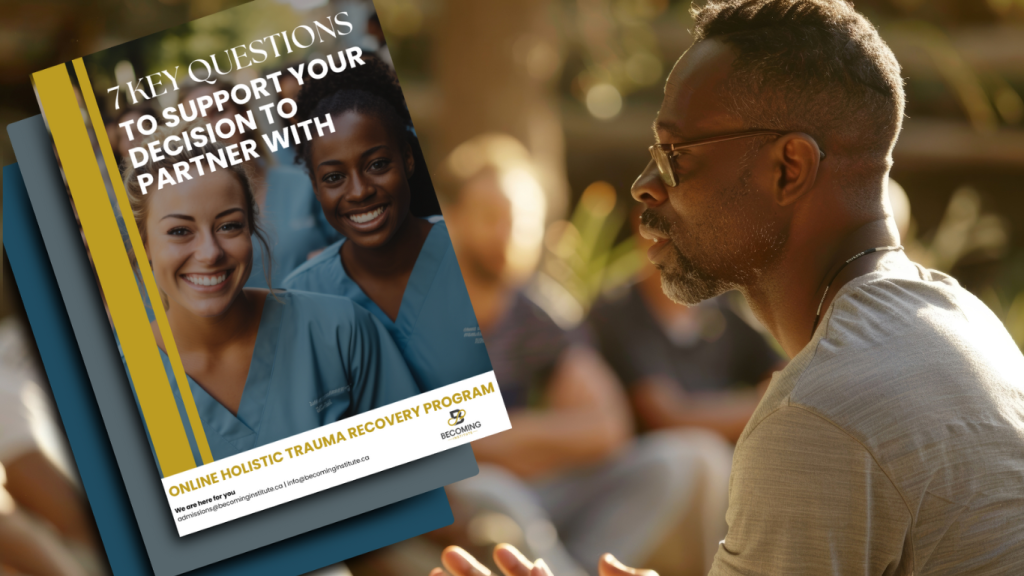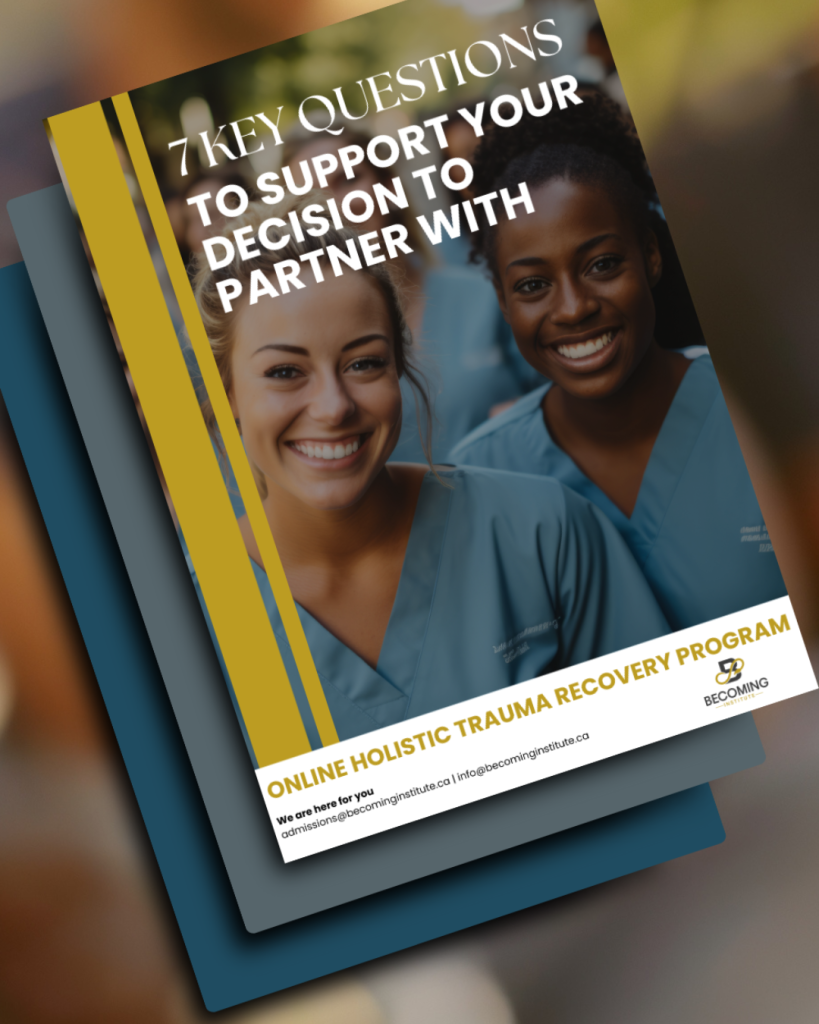Go Beyond Trauma-Informed Care: Master Trauma Recovery
Equip yourself with the skills to not just understand trauma, but to heal it.
Program Highlights:
- Designed for Nurses, Allied Health Professionals & Mental Health Practitioners
- 12-month Comprehensive Training with Hybrid Learning on Brightspace
- Learn & Master the Holistic Principles of the Becoming Method ™
- Mentorship, Peer Support & Expert Faculty Guidance
🔔 Limited Seats Available!

Go Beyond Trauma-Informed Care: Master Trauma Recovery
Equip yourself with the skills to not just understand trauma, but to heal it.
Program Highlights:
- Designed for Nurses, Allied Health Professionals & Mental Health Practitioners
- 12-month Comprehensive Training with Hybrid Learning on Brightspace
- Learn & Master the Holistic Principles of the Becoming Method ™
- Mentorship, Peer Support & Expert Faculty Guidance
🔔 Limited Seats Available!
#Go Beyond Trauma-Informed Care : Master Trauma Recovery
Equip yourself with the skills to not just understand trauma, but to heal it.
Program Highlights:
- Designed for Nurses, Allied Health Professionals & Mental Health Practitioners
- 12-month Comprehensive Training with Hybrid Learning on Brightspace
- Learn & Master the Holistic Principles of the Becoming Method ™
- Mentorship, Peer Support & Expert Faculty Guidance
🔔 Limited Seats Available!

Join a pioneering program that equips nurses and allied health professionals with trauma-informed skills to support deep, lasting healing in the communities they serve.
September 2025
Enroll by June 2025
12 Months
Trauma-informed, practice-based learning
Hybrid
Learn With D2L
English
French Coming Soon

Is Our Program Right For You?
Nurses
Allied Health Professionals
Faculty & Educators
Private & Public Sector Employee
Hands-On Training & Real-World Application
The 12-Month Trauma Recovery Program is designed to bridge theory an practice through field placements in diverse healthcare and community settings. Students will have the opportunity to apply The Becoming Method™ in real-world environments, working directly with individuals, families, and communities to facilitate lasting trauma recovery.
Field placements are available in:
- Hospitals & Primary Care Clinics – Supporting patients with trauma-informed interventions in high-pressure healthcare environments.
- Community Health Organizations – Partnering with Black-led, Indigenous-led, and culturally responsive organizations to provide holistic trauma recovery care.
- Mental Health & Wellness Centers – Applying trauma recovery techniques to support individuals facing anxiety, PTSD, and other mental health challenges.
- Schools & Youth Programs – Working with educators and counsellors to integrate trauma recovery practices into youth support systems.
- Addiction & Recovery Centers – Addressing trauma as a root cause of substance use and dependency.
- Justice & Social Services Programs – Supporting individuals in rehabilitation programs, victim services, and restorative justice initiatives.
Your Path to Success!
Placement Team
With The Becoming Institute’s 100% Placement Assistance, you’re not just completing a program -you’re stepping into a career that transforms lives. We match you with field placements tailored to your care pals, ensuring you gain real-world experience, build professional connections, and develop the confidence to lead in trauma recovery work. From hands-on training to career support, we equip you with everything you need to secure your ideal role and make a lasting impact.
Ready to choose the right trauma recovery certification program?
Not all trauma recovery programs are created equal. Many make big promises, but few truly prepare you for success. Download our free guide to learn the 7 key questions every aspiring trauma recovery professional should ask—so you can invest wisely in a program that will empower your career.

Ready to choose the right trauma recovery certification program?
Not all trauma recovery programs are created equal. Many make big promises, but few truly prepare you for success. Download our free guide to learn the 7 key questions every aspiring trauma recovery professional should ask—so you can invest wisely in a program that will empower your career.

Trauma Recovery Certificate Curriculum
Hour Practicum for Hands-On Experience
Experienced faculties and Industry Experience
Three Transformative Retreats
Curriculum Informed by Regulatory Standards in Nursing and Psychotherapy Developed by experts with a deep understanding of clinical competencies, ethical practice, and trauma-informed care.



Level 1: Self-Health
Becoming 101: Introduction to Psychotherapy
The Power of Shifting Narratives provides a foundational exploration of how personal narratives shape experiences of trauma, illness, and healing. The course emphasizes the role of storytelling in psychotherapy, focusing on how harmful narratives can be dismantled and recontextualized to promote healing and resilience. Students will explore diverse therapeutic approaches, including Indigenous perspectives and decolonizing methods, to better understand how cultural, societal, and historical factors impact trauma recovery. Through case studies, discussions, and practical exercises, students will gain the theoretical knowledge and therapeutic skills needed to help clients reshape their narratives and foster well-being.
Becoming 102: Mindful Fitness Developing Self-Healing Practices for Psychotherapists
This 16-week journey is life altering and mirrors the exact process their clients will eventually experience. Through a combination of theoretical exploration, self-reflection and a final practical assignment, students will gain a comprehensive overview of the fascinating field of psychotherapy. As students reflect on their movement through this process, they will be empowered with the knowledge and understanding to truly support their clients when you become a Trauma Recovery Specialist.
Becoming 103: 3-Day Intensive Training Retreat
Welcome to Becoming 103, a pivotal course within the 12-month Trauma Recovery Certificate at the Becoming Institute. This immersive 3-day in-person training retreat is a transformative experience meticulously designed to instill a powerful ethos within our program—one centered around compassionate empathy and the relentless pursuit of balance and connection.
Becoming 104: Forgiveness & Holistic Trauma Recovery
This course explores the transformative role of conscious forgiveness in healing trauma and overcoming chronic emotional, physical, and relational difficulties. Drawing on insights from David Hawkins, Joan Samuels-Dennis, and Bruce Lipton, students will delve into how forgiveness impacts consciousness and the body at a cellular level, fostering deep psychological and physiological healing.
Becoming 105: Ubuntu – Afro-Descendant & Indigenous Ways of Knowing & Being
This advanced philosophical course takes students on a transformative journey through Afro-centric and Indigenous ways of knowing, using Ubuntu as a foundational lens.
Moving beyond established ideas, this course challenges students to transcend the boundaries of identity, culture, religion, and race, propelling them into new realms of thought about consciousness and reality. By dismantling societal constructs and engaging with spiritual principles of interconnectedness, this course offers students a pathway to discover their highest state of being—one that unites all life beyond labels and categories.
Level 2: Theory & Practice
Becoming 201: Metaphysics and the Process of Becoming on the Healing Journey
Throughout this course, we will delve into metaphysical principles and their pertinence to trauma recovery emphasizing the importance of personal transformation and the role metaphysics plays in assisting individuals on their healing journey. We will examine key topics such as consciousness, perception, causality, energy healing, and personal transformation. Our exploration will equip students with valuable tools to better understand the metaphysical dimensions of traumatic responses and the healing process. Additionally, we will explore how metaphysical principles can illuminate and empower the process of becoming —wholeness of the physical, mental and spiritual self.
Becoming 202: Polyvagal Theory, Trauma, and the Response of The Nervous System
In this course, we delve into the complex realm of trauma and explore Polyvagal Theory as a framework for understanding its impact on the nervous system. We examine the three states of the autonomic nervous system: the ventral vagal, sympathetic, and dorsal vagal states, and how they shape our responses to trauma. Through a series of interactive lectures, case studies, and practical exercises, students will learn how to recognize and differentiate between the various states of the autonomic nervous system in trauma survivors, and develop the skills necessary for effective interventions. The course also covers practical approaches to regulation, co-regulation, and techniques that foster safety and connection in trauma recovery.
Becoming 203: Holistic Trauma Recovery & The Power of the Conscious, Subconscious, and Superconscious Mind
This course explores trauma recovery through a holistic lens, examining the roles played by the conscious, subconscious, and superconscious mind. Drawing on the groundbreaking work of Bessel van der Kolk, students will gain insights into the physiological, psychological, and spiritual dimensions of trauma. The course expands its scope by incorporating contributions from key authors, such as Robert M. Williams, Joseph Murphy, Paul Brunton, and Peter A. Levine, to explore the transformative power of the mind in healing. The curriculum will cover topics such as the impact of trauma on the mind-body connection, the significance of subconscious patterns in shaping behaviors, and the potential for spiritual and superconscious experiences to contribute to the healing process. Through a combination of theoretical exploration, practical exercises, and case studies, students will develop a multifaceted understanding of trauma recovery that incorporates psychological, spiritual, and somatic dimensions of care.
Becoming 204: Epigenetic & Intergenerational Trauma
In this course, we will explore the emerging field of epigenetics and its intersection with intergenerational trauma. We will examine the impact of adverse childhood experiences (ACEs) on genetic expression and the transmission of trauma between generations. By dissecting the profound mechanisms through which traumatic experiences leave an imprint on our DNA, we will uncover new insights into healing, prevention, and intervention strategies. Through a combination of lectures, case studies, and interactive discussions, participants will leave with a comprehensive understanding of the dynamic relationship between epigenetics and intergenerational trauma.
Becoming 205: Introduction to Cognitive-Behavioral Therapy
This course delves into the foundations and nuances of Cognitive-Behavioral Therapy, emphasizing the contributions of Dr. Christine A. Padesky. Participants will explore key concepts such as cognitive restructuring, problem-solving, and the collaborative empiricism inherent in CBT. The course will also address the innovative approaches presented in Dr. Padesky’s work, especially as exemplified in her co-authored book, “Mind Over Mood.” Through engaging discussions and practical activities, participants will learn how to adapt CBT techniques to various populations and presenting issues. The course will cover the integration of mindfulness, interpersonal effectiveness, and other therapeutic strategies to enhance the flexibility and effectiveness of CBT interventions.
Becoming 206: 3-Day Advanced Integration Retreat
This 3-day advanced integration retreat offers an in-depth exploration of the Becoming Method™, empowering students to seamlessly integrate their prior knowledge, experiences, and advanced techniques into trauma recovery practice. Designed to refine and elevate students’ therapeutic skills, this retreat is a pivotal step in their journey to becoming adept practitioners. Each day is structured to balance theoretical discussions with practical applications, allowing ample time to engage in advanced practice techniques and simulations.
Students will deepen their understanding of the Becoming Method™ principles and enhance their therapeutic toolkit with specialized approaches for complex trauma recovery. They will be encouraged to bring their unique experiences and insights into the process, fostering a personalized approach that enriches their professional practice and impacts client outcomes.
Level 3: Practicum
Becoming 301: Authentic & Intuitive Communication for Trauma Recovery Specialists
Offered in conjunction with our 12-week practicum, this course is designed to enhance student’s capacity to authentically and intuitively connect with clients engaged in psychotherapy. Through case studies and practice sessions, both individually and in groups, students will learn various techniques to embody authenticity, foster trust and rapport, and achieve positive therapeutic outcomes. This course will explore advanced communication techniques, including active listening, effortlessly reading and responding to nonverbal communication, and verbal fluency.
Becoming 302 – Holistic Therapeutic Assessments in Practice
This course delves into the dynamic interplay between standardized assessments and holistic approaches in the therapeutic process. Students will explore the application of standardized assessments alongside holistic methods, such as applied kinesiology and David Hawkins’ map of consciousness. Emphasis will be placed on developing proficiency in assessing, interpreting, and working collaboratively with clients to identify therapeutic priorities. Practical integration of these approaches into the concurrent 16-week practicum will be a key focus.
Becoming 303: Psychotherapeutic Standards of Practice
This course delves into the essential Psychotherapeutic Standards of Practice, focusing on the principles and guidelines established by regulatory authorities, with a primary emphasis on the standards set by the College of Registered Psychotherapists of Ontario (CRPO) and the College of Nurses of Ontario . Topics covered include ethical considerations, professional boundaries, confidentiality, informed consent, cultural competence, and legal responsibilities. Through case studies, interactive discussions, and reflective exercises, students will develop a nuanced understanding of these standards and learn to apply them effectively in real-world therapeutic scenarios.
Becoming 304: 1000-Hour Psychotherapeutic Practicum
This 1000-hour psychotherapeutic practicum offers students the opportunity to apply their knowledge and skills in a real-world therapeutic environment, working closely with 12 clients presenting a range of traumatic responses. Through hands-on experience and close supervision, students will navigate the entire therapeutic process—from conducting intake and standardized assessments to applying the Becoming Method™ and integrating therapeutic coaching.
Emphasizing real-world applications of theoretical knowledge, reflective self-evaluations, and regular supervision, this practicum provides a comprehensive understanding of psychotherapeutic practice, fostering continual improvement and professional growth.
Becoming 305: Final Practice Exam
The Final Practice Exam is a comprehensive assessment designed to evaluate students’ proficiency as psychotherapists by guiding three clients through the entire therapeutic process. This final exam tests students’ ability to conduct intake assessments, implement effective psychotherapeutic interventions, and perform a thorough self-evaluation of their practice. Students will have three opportunities to demonstrate independence, clinical decision-making, and therapeutic expertise.
Following the first two client interactions, students will receive constructive feedback to refine their approach. On the third and final attempt, a pass/fail grade will be assigned based on students’ ability to exhibit the core competencies required for trauma recovery work. Successfully passing the exam will earn students certification as Trauma Recovery Specialists from the Becoming Institute, signifying their readiness to make a meaningful impact in the field of trauma recovery.
The Becoming Institute Advantage
100% Career Fulfillment
We go beyond teaching—you graduate with clarity, confidence, and purpose. Our program prepares you to excel in your career as a certified trauma recovery specialist. From healthcare to private practice, we open the doors to diverse career paths where your skills will make a meaningful impact.
Grow Your Practice. Expand Your Possibilities.
This program supports regulated professionals in expanding their scope of practice through advanced trauma-informed care training. Many graduates have gone on to take on more specialized roles or launch independent practices, often seeing increased opportunities for income and leadership as a result of their deepened expertise.
Flexible Online Delivery
- Learn from the comfort of your home with live online classes every Friday.
- Access recorded sessions, resources, and support through our cutting-edge learning platform.
- Designed for working professionals and students alike.
Tailored Career Support
We are invested in your success. Our 100% Placement Assistance ensures that you are job-ready upon graduation. From crafting standout resumes to preparing for interviews and networking with top employers, our support team is with you every step of the way.
Transformative Outcomes
Our program is not just about certification—it’s about transformation. You’ll gain the tools, experiences, and insights to become a catalyst for healing in your community, helping individuals recover from trauma and thrive.
Empowering Community
Join a community of like-minded professionals, alumni, and faculty who are passionate about creating change. Through workshops, mentorship programs, and alumni events, you’ll stay connected and inspired.
Scholarship Up to $1,500
What’s Included:
- Trauma recovery certification in half the time with better patient outcomes
- Live Online Classes for flexible learning.
- 1,000+ Hours of Practical Training to ensure real-world readiness.
- Comprehensive Placement Assistance with career support.
- Exclusive Networking Opportunities with industry leaders.
- Access to Expert Mentors and Alumni Network.
Start Date
May 09, 2025
Limited Seats Available
Speak with our expert counsellors to explore how this program can elevate your professional journey and impact communities.
Frequently Asked Questions
What is the 12-Month Trauma Recovery Certificate Program?
The 12-Month Trauma Recovery Certificate Program is an intensive course designed to equip students with the knowledge, skills, and practical experience to become Certified Trauma Recovery Specialists (CTRS). The program focuses on holistic trauma recovery methods, emphasizing Afro-descendant and Indigenous healing practices alongside evidence-based psychotherapy.
Who is this program for?
Is the program recognized by professional organizations?
The program is not yet formally recognized by regulatory bodies—but it was developed in alignment with professional guidelines and competencies used across psychotherapy and nursing in Ontario.
Our faculty includes experts in trauma recovery, nursing, and psychotherapy regulation, and we are actively engaged in dialogue with professional colleges to explore appropriate pathways for recognition. As we continue that process, students can feel confident knowing they are part of a well-designed, forward-moving program grounded in safe, ethical, and transformative care.
What are the prerequisites for enrolling in this program?
How can I apply for the program?
Is financial aid or scholarships available?
What is the structure of the program?
The program is divided into three 16-week semesters:
- Semester 1: Foundations in psychotherapy and self-healing, including a 3-day retreat.
- Semester 2: Advanced trauma recovery techniques and a 5-day integration retreat.
- Semester 3: A 1,000-hour supervised practicum and a major research project.
How are the courses delivered?
What is the Becoming Method™?
What does the 1,000-hour practicum involve?
Will I receive job placement support after graduation?
What career opportunities are available after completing the program?
Graduates can pursue roles such as:
- Trauma Recovery Specialist
- Nurse Psychotherapist (for nursing graduates)
- Community Mental Health Worker
- School Counselor
- Crisis Intervention Specialist
- Private Practice Therapist
What sets this program apart from other trauma recovery courses?
The Becoming Institute’s program uniquely combines culturally responsive practices, holistic healing methods, and professional standards set by industry experts. It focuses on quick, lasting trauma resolution tailored to Afro-descendant and Indigenous communities.
How does this program prepare me for real-world practice?
What certifications will I receive upon completion?
Where are the retreats held?
What support is available to students during the program?
Can international students apply for the program?
At this time, the program is open to Canadian residents only. International applications will be accepted once our DLI number is finalized.
Contact us
For additional questions or to speak with an admissions advisor, please contact us at hello@becominginstitute.ca or call (647) 265-0804.



